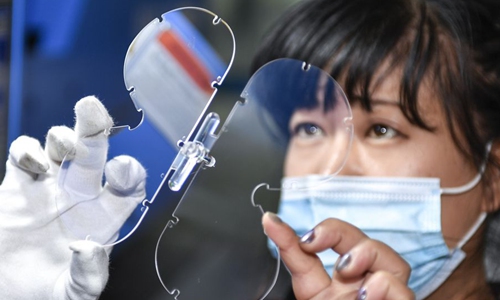Deputies brainstorm support for businesses
By GT staff reporters Source:Global Times Published: 2020/5/25 22:11:51
Credit, supply chain pivotal to resilience of Chinese enterprises

A worker checks the quality of lenses of medical protective goggles at a factory of a company in Helong, Yanbian Korean Autonomous Prefecture, northeast China's Jilin Province, May 6, 2020. (Xinhua/Xu Chang)
Deputies to the ongoing National People's Congress suggest the government work out more measures to help the country's struggling export sector, and assist hundreds of thousands of the small- and medium-sized businesses which have been seriously battered by the Covid-19 outbreak.
Speaking Monday during the annual National People's Congress (NPC) session, Chinese Commerce Minister Zhong Shan said that stabilizing foreign trade and foreign investment is a matter of significance.
Foreign trade and foreign investment, an important driving force of economic growth, contributes to over 25 percent of the nation's tax revenues and creates more than 200 million jobs, Zhong, an NPC deputy said.
Chinese Premier Li Keqiang said in his government work report to the NPC that China will try to stabilize the overall performance of foreign trade, keep industrial and supply chains stable and continue to open the nation's doors more widely to the world.
Among efforts to help Chinese businesses get more orders and ensure employment are rising credit insurance coverage, lowering compliance costs for imports and exports, and support for export items to be sold domestically, per the government work report.
Also, members of the Chinese People's Political Consultative Conference (CPPCC), the top political advisory body, have voiced suggestions aimed at energizing the export sector.
Keeping industrial and supply chains intact is the prerequisite to stabilize foreign trade and investment, the Economic Daily quoted Gao Rongkun, head of Shanghai Customs and a CPPCC member, as saying.
The nation ought to strive to modernize its industrial chains and push for coordinated development of regional industrial clusters, improve domestic firms' capability to deal with emergencies and to strike a balance between international and home markets, Gao said.
NetEase CEO William Ding Lei, who is a CPPCC member, said there needs to be ramped-up policy support to inspire digital cultural products to be exported. This way, more jobs will be created, resulting in a new source of growth in the nation's foreign trade.
Ma Guoxiang, chairman of Shanghai Xiangjiang Industrial Co and a CPPCC member, proposed that cross-border e-commerce is an important force to combat Covid-19 spread. The cross-border e-commerce sector, exemplified by a majority of small- and medium-sized private firms, has shown vitality.
China's April exports surprised the market with a 3.5 percent growth year-on-year in US dollar terms, the first positive reading for the year, while imports fell 14.2 percent.
Still, the continued spread of the pandemic and simmering tensions between China and the US cast uncertainty over the outlook for the export sector.
It's estimated that China's exports will fall by double digits in the coming one to two quarters, leading to job losses of about 10 million, Lu Ting, chief China economist at Nomura, said.
Workers employed by small- and medium-size firms, private businesses, export-oriented ventures, labor-intensive manufactures and services businesses are feeling pressure over the risk to their jobs, Lu said.
The pandemic has elevated the pressure on operations by small- and medium-sized firms, said Yao Jinbo, founder and CEO of Chinese classifieds site 58.com.
Yao said there will not be any big problems with China's job market, and the economy will get back on track so long as the development issues confronting its small businesses are dealt with properly.